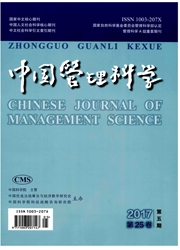

 中文摘要:
中文摘要:
个体小规模、分散式的生产方式以及信息不对称的经营环境,导致了我国农户在农产品供应体系中的弱势地位,政府通常采用保护价收购和价格补贴等行政干预手段保护农民利益。论文构建了信息不对称条件下,考虑渠道商价格欺诈的农户、渠道商以及政府的三方演化博弈模型,分析了政府“惩罚”+“保护价收购”双重干预下的博弈演化过程及稳定策略,探讨了政府监管的边界问题,并应用实例进行了验证。研究结果表明:政府监管的概率与选择“欺诈”策略的渠道商规模和选择“销售”策略的农户规模相关;渠道商选择“欺诈”策略的概率随农产品交易规模的增大而提高,随罚金额度的增加而下降;政府的保护价收购政策不一定能保证积极的效果,不合理的折价系数可能破坏现有的市场秩序。说明了合理、适度的市场监管对于维护农产品交易市场秩序具有重要意义。
 英文摘要:
英文摘要:
The scattered and small-scale production mode, together with asymmetric business informationresults in the Chinese farmers weak position in agricultural supply chain. Chinese government has imple-mented some effective intervention measures, such as minimum price for agricultural products procurementand price subsidy, to safeguard farmer's benefits. By establishing a tripartite evolutionary game model inconsideration of price gouging and information asymmetry, the relationship among farmers, dealers of ag-ricultural products and government is analyzed, the boundary of administrative control is also discussed. Acase study is given to demonstrate the interrelationships among action, evolutionary path and evolutionarystable strategy(ESS) in the end. The results show that the government would take intervention to punishprice gouging, when the size of illegal dealers or the number of farmers involved in trading reaches a cer-tain scale; the probability of dealers choosing fraud strategy is affected by two main factors: the strengthof government's intervention and the scale of agricultural products in trading, it declines with the increaseof the amount of the fines and increase with the deasize of agricultural products; the minimum price sys-tem for purchasing agricultural products can't ensure a positive effect, but an unreasonable discount coeffi-cient may destroy the market system. Therefore, it illustrates that taking reasonable and effective inter-vention measures makes great significance to protect farmers and maintain market order.
 同期刊论文项目
同期刊论文项目
 同项目期刊论文
同项目期刊论文
 期刊信息
期刊信息
